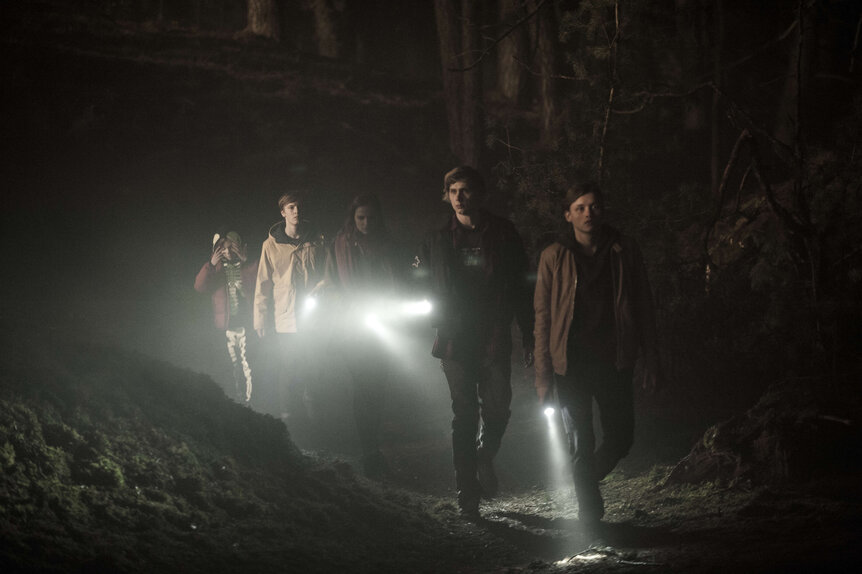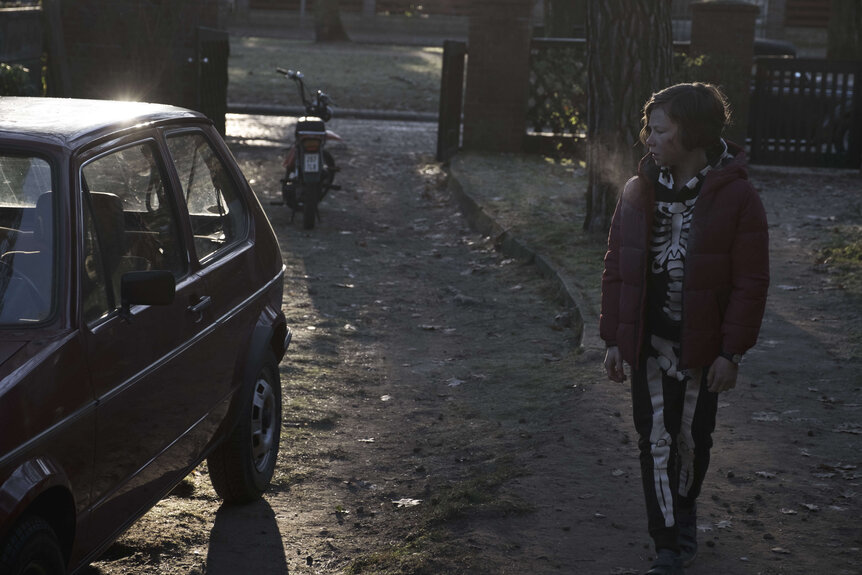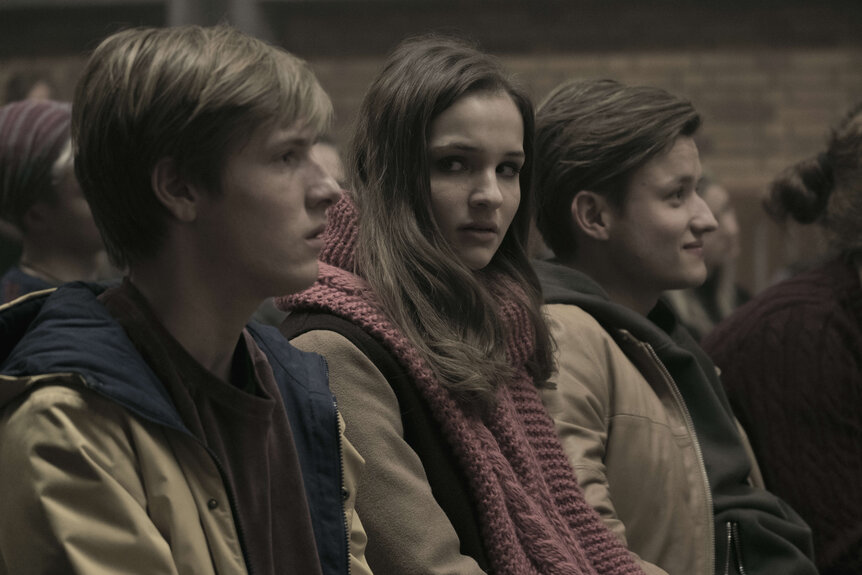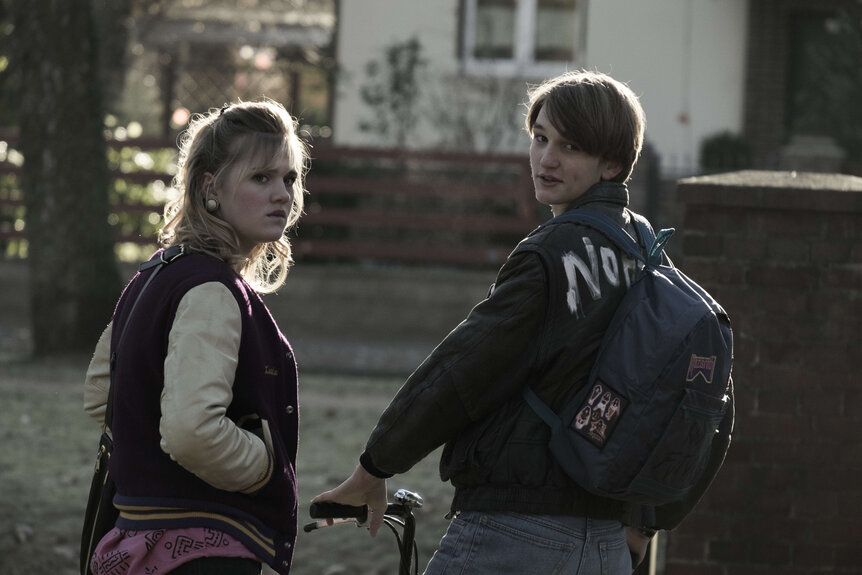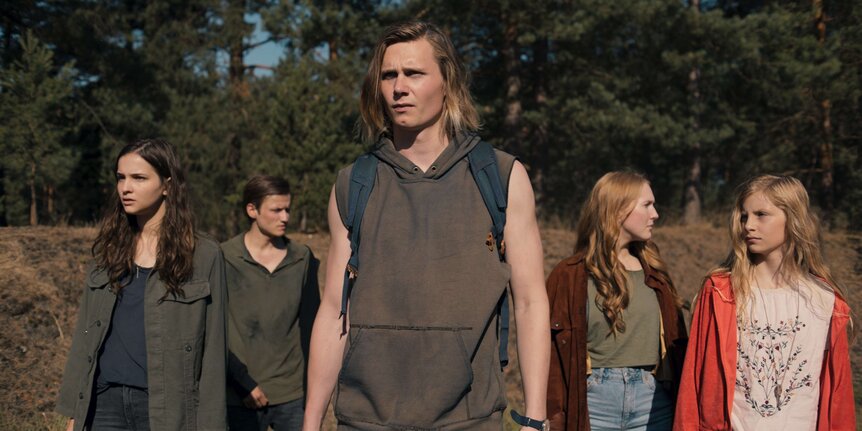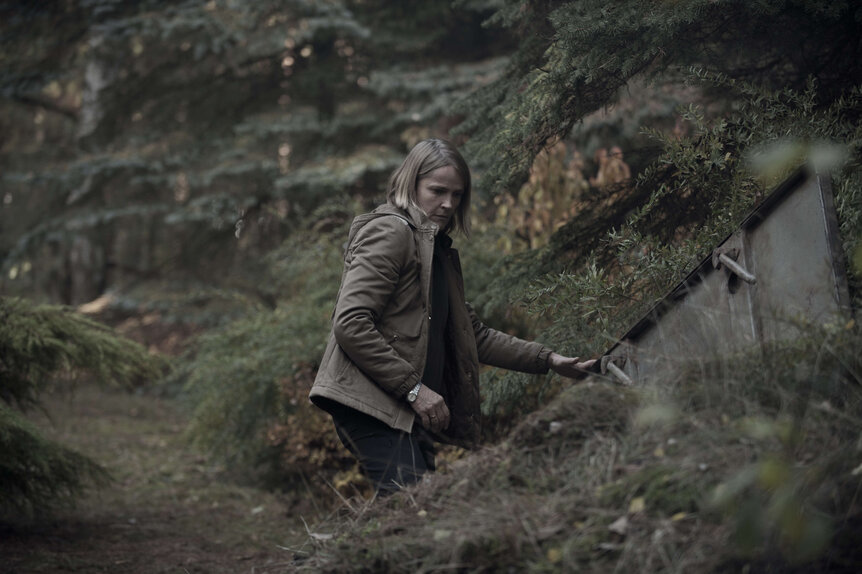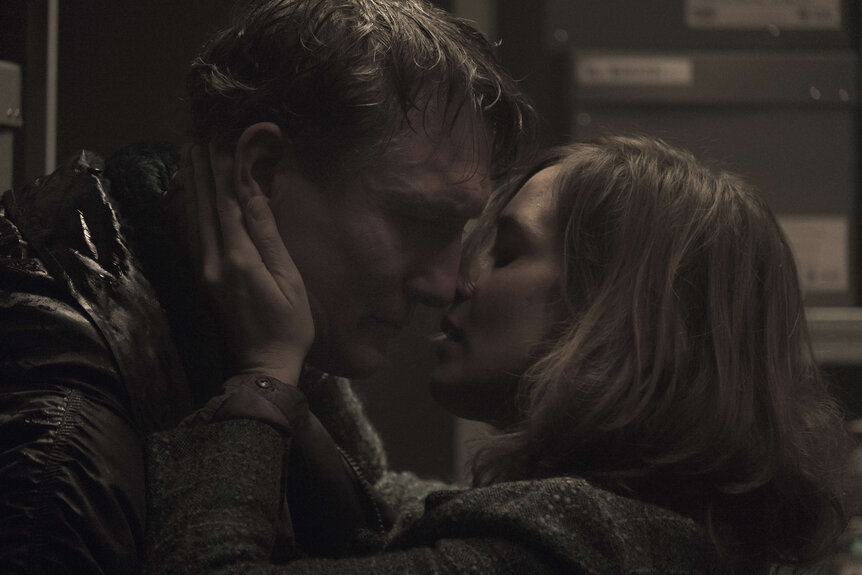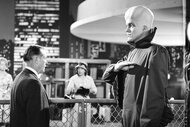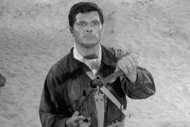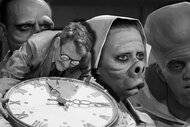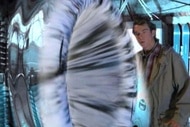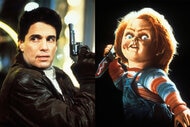Create a free profile to get unlimited access to exclusive videos, sweepstakes, and more!
How German sci-fi Dark deftly mixes time travel with melodrama

"What if everything that came from the past was influenced by the future?"
Clockmaker and author of the fictitious A Journey Through Time, H. G. Tannhaus (Christian Steyer) asks this in the opening monologue of Dark's fourth episode. The German science-fiction series is about to air its third and final season on Netflix (landing June 27), which will hopefully answer some existence-defining questions for the residents of Winden. One of the most ambitious TV shows dealing with the concept of time travel, Dark manages to serve up quantum mechanics and existentialist dilemmas while dishing out soap opera-level twists and relationship melodrama.
Greek mythology, teen angst, and time travel intersect via the tale of Ariadne's red thread while references to The Matrix, thrash metal band Kreator, and Harry Houdini are all relevant to the narrative. In this family saga, creators Jantje Friese and Baran bo Odar carefully balance jaw-dropping twists without dumbing down the scientific or philosophical propositions.
H.G. Wells coined the term "time machine" in his 1895 novella The Time Machine, but the concept of traveling to a different year goes back even further. Memoirs of the Twentieth Century was written in 1733 by Samuel Madden, which tells the story of a guardian angel who has letters from 1997 and 1998. There are now a vast array of time machines littering pop culture, whether a DeLorean car, ancient stones, or the TARDIS. Each time travel narrative has its own rules dictating what periods can be accessed and who you can interact with.
For most, it is imperative to avoid changing too much because the side effects could wipe someone out of existence. Back to the Future's disappearing family photograph is an iconic image, the result of Marty McFly's (Michael J. Fox) mother unknowingly getting the hots for her own son. However, if you think this sounds weird, just wait for the familial dynamics and twists that Dark has already dished out in its first two seasons.
Spoilers for Dark Seasons 1 and 2 ahead
the first episode of Dark opens on an Albert Einstein quote — "The distinction between past, present, and future is only a stubbornly persistent illusion" — which emphasizes the central conceit before the notion of time travel has even been suggested. The first episode has the eerie small-town quality of Twin Peaks coupled with the underbelly of secrets that both British crime drama and Nordic Noir excel at.
Affairs, teen crushes, and complex dynamics between characters who have lived in Winden their entire lives (and the two generations before them) add to the unsettling vibe, even before young Mikkel Nielsen (Daan Lennard Liebrenz) vanishes into thin air. He is the second child to disappear in weeks and his uncle met the same unexplained fate 33 years beforehand. A mysterious cave, a nuclear plant that is going to be decommissioned in a week, and a body of a different unidentified child all add to the creepy atmosphere.
Mikkel loves magic — he wants to be the next Harry Houdini. When explaining a trick to his police detective father Ulrich Nielsen (Oliver Masucci), Mikkel tells him, "Dad, the question isn't how, the question is when." A line of thought that will become more pertinent with each passing episode. Mixing quotes from Einstein with theories about loopholes, black matter, and debates centering on the nature of man, the mystery of Dark unfolds at a rapid pace.
Relationship conflicts and illicit love affairs are just as vital to the alchemy of this gripping story as the time travel that further complicates matters of the heart. These families who have grown up alongside each other share roots reaching further than any of them could ever possible fathom — well, aside from the few keeping the deep dark secrets. You thought Back to the Future delivered a family dilemma for the ages? Well imagine if you found out your father is the kid who went missing in 2019.
Yellow raincoat-wearing Jonas Kahnwald (Louis Hofmann) has regular teen issues to deal with, including a precarious romance with the girl who is now dating his best friend. A girl he hooked up with during the summer, just before events took a turn for the tragic. The day after Jonas' encounter with Martha Nielsen (Lisa Vicari), his father Michael (who is Mikkel) died by suicide, and the frayed edges of this community began to unravel.
When Mikkel disappeared on that fated November 2019 night, he ended up in the same cave but in 1986. His father still lives in the same house — a lot of the Winden residents live where they grew up — but he is a teenager who has no time for this kid he doesn't recognize. Considering the lengths older Ulrich will go to while searching for his son, finding out he was there all along is quite the cosmic gut-punch. Other mind-frazzling relationship twists include Jonas' mother being in love with Ulrich from when she was 14 years old and having an affair with him in the present, unaware that her husband is her lover's son. Oh, and Martha? She is Mikkel's sister, so Jonas is in love with his aunt. How very Game of Thrones.
There aren't any dragons, but the apocalypse is nigh, and so far every attempt to stop an event has only caused it. This includes Ulrich beating a child's head in with a rock in 1953 because he thinks this will stop the events in 1986 and 2019. Essentially, he is pulling a micro version of the "killing baby Hitler" ethical debate. Instead, Ulrich's violent attack on young Helge Doppler (Tom Philipp) facilitates the tragic chain reaction that results in the death and disappearance of the children — including his brother and son, 33 years apart.
"Winden is like a festering wound. And we're all part of it," Ulrich's wife Katharina (Jördis Triebel), announces on a local radio call-in about the recent events. An emotionally charged assessment of this supposed tight-knit community carefully nails the deception that seeps into every home. Secrets poison the generations that stayed to work in a town bolstered by nuclear power, which in and of itself has been detrimental to the environment. Relationship entanglements and romances date back to 1921 and leap forward to 2052, which includes those frequently traveling through the caves to these dates. Talk about long-distance love that defies time and space.
The roots of these family trees intersect in ways that will make you furrow your brow in confusion; however, the second season takes this first mind-bending reveal and laughs in its face. Ulrich's partner Charlotte Doppler (Karoline Eichhorn) has only just found out her father is one of the people traveling through time, she doesn't yet know that her youngest daughter Elisabeth (Carlotta von Falkenhayn) is also her mother. Quite the heavy bombshell, which even most daytime soaps would not be able to pull off.
Five different periods feature characters at different ages, but some figures freely move between the fixed points separated by 33 years. Antagonists with Biblical names like Adam (Dietrich Hollinderbäumer) and Noah (Mark Waschke) seemingly pull all the strings across the ages. Personifying time so it becomes akin to God is part of this discussion centering on human existence and free will (or the lack thereof), Adam explains, "In short, the God mankind has prayed to for thousands of years, the God that everything is bound with, this God exists as nothing other than time itself." However, they have strong competition from women with deep ties to this location who are also serving as puppet masters dictating how this war will play out. Noah's sister Agnes Nielsen (Antje Traue) — and Ulrich's grandmother — and Claudia Tiedemann are just as influential as the men at the helm. Claudia was once in charge of the power plant and now she has earned herself quite the nickname: the White Devil.
One Latin phrase is etched onto gateways and repeated throughout also represents the society of travelers. "Sic Mundus Creatus Est" means "Thus, the world was created" and it is central to this notion of looping cycles that cannot be altered. Never say never, as the Season 2 finale threw down a multi-verse cliffhanger.
The mind-bending narrative has long suggested the world is split into three, "Nothing is complete without the third dimension. There isn't just only going up and down. There's a center as well. When describing the Time-Space continuum, Einstein and Rosen overlooked something," explains Tannhaus in the first season. "A wormhole connects not just two, but three different dimensions. It connects the past, present, and future." Light and dark is one battle, but the finale's introduction of another Martha separate to the one lying dead on Jonas' kitchen floor could be the key to breaking the cycle.
So many of the main players have motives pertaining to the apocalypse, but one person who is slyly impacting events has zero desire to control time. Nevertheless, this doesn't mean her actions haven't had a huge influence on the Winden landscape. Jonas' mother Hannah Kahnwald (Maja Schöne) is a villain fit for a melodrama. She lies and schemes with self-interest as the driving force. It is fascinating to see how much power she wields, especially as she is first presented as a lover turned Fatal Attraction-style obsessed ex. Fed up with how she is being treated in her own time, she heads back to the 1950s to enact her revenge, opting to stay in the mid-century. It is unclear how much influence or damage she will have over events in Season 3 but don't underestimate her will.
Each point in the past represents a historical fracture, as well as ruptures in personal dynamics. Two of the periods are not long after a World War this country lost, which sees them trying to rebuild for a better future. In the case of the '50s, this West German town is embracing the fuel of the Cold War that is being sold as a better tomorrow. Unfortunately, it becomes the festering wound that Chernobyl symbolizes — acid rain from this incident is referenced in 1986.
When Dark returns for Season 3 on the date the apocalypse will hit Winden (June 27, 2020), the fight for existence is on, but so is the fight for family, no matter where in time they currently are. This is a so-called "good" community where nothing bad happens — aside from child murders littering those specific years. Deftly blending genres, Dark tells a mind-bending story while also serving up a relatable examination of relationships. It is possible to tell a family saga within the framework of quantum mechanics and to do so without dumbing down the science or forfeiting the high drama. Matters of the heart are given as much weight as the meaning of life — what could be more human than that?

